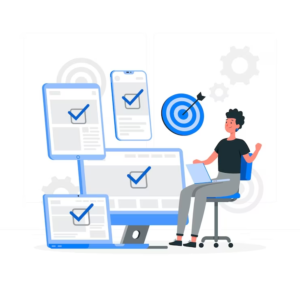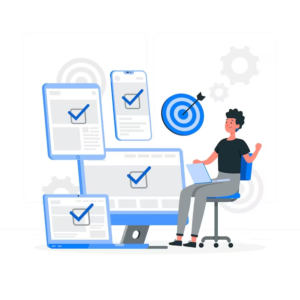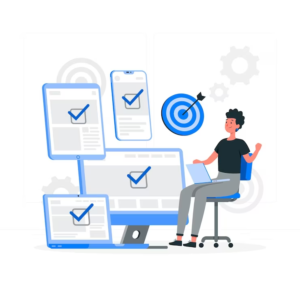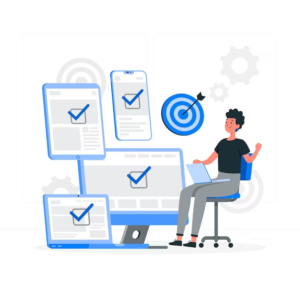In today’s digital era, where data serves as the cornerstone of business operations, ensuring data’s reliability, accuracy, and integrity is paramount. The exponential growth of data volumes across industries has accentuated the need for robust mechanisms to analyze, cleanse, and manage this wealth of information. This is precisely where data profiling tools emerge as indispensable assets in data management.
What Is Data Profiling?
Before delving deeper into the world of data profiling tools, it’s essential to understand the concept of data profiling itself. Data profiling involves systematically examining and analysing data to gain insights into its structure, quality, and content. It helps understand the data’s characteristics, such as completeness, accuracy, consistency, and uniqueness, paving the way for better data management and decision-making processes.
Why is Data Profiling Important?
The significance of data profiling cannot be overstated. With the exponential growth of data across industries, ensuring its reliability and accuracy has become paramount. Data profiling enables organizations to:
- Data Quality Enhancement: Identifying inconsistencies, errors, or anomalies within datasets, leading to improved accuracy and reliability.
- Insight Generation: Uncovering hidden patterns, correlations, and relationships within data, enabling informed decision-making and strategic planning.
- Regulatory Compliance: Ensuring adherence to regulatory standards by validating data integrity and consistency.
- Operational Efficiency: Streamlining data management processes and enhancing the overall efficiency of data-driven operations.
What Are Data Profiling Tools?
Data profiling tools are specialized software solutions designed to automate and streamline examining and analyzing data. These tools utilize various techniques to scrutinize data sets, identify patterns, and uncover hidden insights, contributing to better data quality management.
In the following sections, we’ll delve deeper into data profiling tools, exploring their types, features, pros, cons, and the criteria for choosing the right tool for specific business needs.
Types of Data Profiling Tools
Data profiling tools come in various types, each tailored to specific data analysis needs. Understanding these types can aid in selecting the most suitable tool for a particular task. Here are some common types:
- Rule-Based Profilers: These tools apply predefined rules to assess data quality. They check for adherence to set standards and identify data that doesn’t meet the specified criteria.
- Column Profilers: Focused on individual data columns, these tools analyze attributes such as data type, range, uniqueness, and null values within a column.
- Holistic Profilers: Offering a comprehensive view, these tools analyze entire datasets, examining relationships between data elements and identifying patterns across multiple columns.
- Metadata Profilers: These tools extract and examine metadata to understand data structures, relationships, and usage, providing insights into data lineage and its impact on various processes.
- Statistical Profilers: Utilizing statistical methods, these tools analyze data distributions, frequencies, correlations, and anomalies, aiding in data trend identification and anomaly detection.
Each type of data profiling tool serves unique purposes, catering to specific data analysis requirements within an organization.
10 Best Data Profiling Tools
- Informatica Data Quality
- Talend Data Preparation
- IBM InfoSphere Information Analyzer
- Alteryx Designer
- SAP Information Steward
- Dataedo
- Trifacta Wrangler
- Microsoft SQL Server Integration Services (SSIS)
- Oracle Data Profiling
- OpenText Magellan Data Discovery
#1. Informatica Data Quality
Informatica Data Quality stands out as one of the most comprehensive and robust Data Profiling Tools available in the market. Renowned for its prowess in examining, assessing, and enhancing data quality across diverse datasets, it serves as a cornerstone for organizations aiming to elevate their data integrity.
Features:
- Profiling of various data sources (structured and unstructured)
- Data standardization and cleansing functionalities
- Integration with other Informatica solutions for seamless data management
- Rules-driven data quality assessment and anomaly detection
- Scalability for large datasets
- Support for compliance and governance initiatives
Pros:
- Powerful data profiling capabilities
- Extensive integration options
- User-friendly interface
- Strong data standardization features
- Effective anomaly detection
Cons:
- Higher cost compared to some other tools
- The steeper learning curve for beginners
#2. Talend Data Preparation
Talend Data Preparation is an indispensable asset among Data Profiling Tools, facilitating intuitive data analysis, cleansing, and preparation tasks. Its user-friendly interface and efficient functionalities empower users to delve deep into their data, ensuring accuracy and consistency.
Features:
- Intuitive data profiling functionalities
- Data cleansing and enrichment options
- Visual representations for easy data analysis
- Collaboration features for team-based data preparation
- Compatibility with various data sources
- Automation of data quality tasks
Pros:
- User-friendly interface
- Efficient data cleansing capabilities
- Support for collaborative work
- Seamless integration with other Talend solutions
Cons:
- Limited advanced profiling features compared to specialized tools
- May require additional plugins for certain functionalities
#3. IBM InfoSphere Information Analyzer
IBM InfoSphere Information Analyzer stands tall as a powerhouse among Data Profiling Tools. With its advanced capabilities for in-depth data profiling and analysis, it enables organizations to delve deep into their datasets, ensuring unparalleled data quality and governance.
Features:
- Advanced data profiling and analysis capabilities
- Metadata management and lineage tracking
- Rule-based analysis for data quality assessment
- Integration with IBM’s data governance solutions
- Support for various data sources and formats
- Customizable reporting and visualization options
Pros:
- Powerful data profiling and metadata management
- Extensive integration within IBM’s ecosystem
- Customizable and detailed reporting
- Strong support for compliance and governance
Cons:
- Complex setup and configuration
- Requires a learning curve for effective utilization
#4. Alteryx Designer
Alteryx Designer emerges as a versatile tool among Data Profiling Tools, seamlessly blending data profiling, preparation, and transformation. Its user-friendly interface and robust features aid in elevating data analysis and cleansing endeavours within organizations.
Features:
- Drag-and-drop interface for data blending and profiling
- Workflow automation for data preparation tasks
- Advanced analytics and predictive modelling options
- Integration with various data sources and platforms
- Collaboration features for team-based projects
- Scalability for handling large datasets
Pros:
- User-friendly interface suitable for non-technical users
- Workflow automation for efficient data preparation
- Advanced analytics capabilities
- Seamless integration with diverse data sources
Cons:
- Pricing might be higher for smaller businesses
- Steeper learning curve for some advanced features
#5. SAP Information Steward
SAP Information Steward is a cornerstone within the SAP ecosystem, offering impeccable Data Profiling Tools functionalities. Its focus on data governance, quality assessment, and metadata management reinforces data integrity within organizations.
Features:
- Data profiling and quality assessment functionalities
- Metadata management and lineage tracking
- Integration with SAP’s data governance solutions
- Rules-based analysis for data quality improvement
- Collaboration features for data stewardship
- Support for diverse data sources and formats
Pros:
- Strong data governance and metadata management capabilities
- Integration with SAP solutions for seamless operations
- Effective data quality assessment and improvement
- Collaboration features for data stewardship
Cons:
- Complex setup and configuration
- High licensing costs may be a barrier for smaller organizations
#6. Dataedo
Dataedo, amidst the realm of Data Profiling Tools, specializes in meticulous data documentation and metadata management. With built-in data profiling capabilities, it aids organizations in comprehensively understanding and managing their data assets.
Features:
- Documenting and cataloging data assets
- Visual data dictionary for enhanced understanding
- Data profiling and metadata management functionalities
- Collaboration features for team-based documentation
- Support for various databases and data sources
- Customizable reports and documentation templates
Pros:
- Streamlined data documentation and metadata management
- Intuitive interface for easy data cataloging
- Effective collaboration for team-based projects
- Comprehensive documentation options
Cons:
- Limited advanced data profiling features compared to specialized tools
- It might require additional customization for complex data environments.
#7. Trifacta Wrangler
Trifacta Wrangler emerges as a user-friendly and visually engaging tool among Data Profiling Tools. It empowers users to conduct interactive data profiling and transformations, ensuring data accuracy and reliability.
Features:
- Visual data profiling capabilities
- Interactive data cleaning and transformation options
- Suggestions and automation for data preparation tasks
- Collaboration features for team-based work
- Support for various data formats and sources
- Scalability for handling large datasets
Pros:
- User-friendly interface suitable for non-technical users
- Visual data exploration and transformation
- Automation for repetitive data preparation tasks
- Collaboration features for team projects
Cons:
- Limited advanced functionalities compared to some specialized tools
- Steeper learning curve for complex transformations
#8. Microsoft SQL Server Integration Services (SSIS)
Microsoft SQL Server Integration Services (SSIS) integrates data profiling components within SQL Server environments, enhancing data management and analysis. Its array of built-in tasks and transformations contributes to proficient data profiling endeavors.
Features:
- Data profiling and cleansing components
- Integration with SQL Server for data management tasks
- An array of data transformation options
- Scalability for handling enterprise-level data
- Support for SQL Server databases and external data sources
- Extensive library of built-in tasks and transformations
Pros:
- Integration with SQL Server for seamless operations
- Diverse set of built-in tasks and transformations
- Scalability for handling large datasets
- Compatibility with SQL Server environments
Cons:
- The interface might be overwhelming for beginners.
- Limited functionality when compared to standalone data profiling tools
#9. Oracle Data Profiling
Oracle Data Profiling serves as a cornerstone within the Oracle ecosystem, offering robust Data Profiling Tools functionalities for data quality assessment and improvement. Its focus on Oracle databases ensures meticulous data scrutiny and enhancement.
Features:
- Profiling and analysis of data within Oracle databases
- Rules-based data quality assessment
- Integration with Oracle’s data management solutions
- Identification of data anomalies and inconsistencies
- Support for metadata management
- Customizable reporting and visualization options
Pros:
- Integration within the Oracle ecosystem for seamless operations
- Comprehensive data profiling capabilities
- Strong support for Oracle databases
- Customizable reporting and visualization options
Cons:
- Might have limitations outside the Oracle ecosystem
- Complex setup and configuration process
#10. OpenText Magellan Data Discovery
OpenText Magellan Data Discovery serves as a beacon among Data Profiling Tools specializing in unstructured data analysis. Advanced text analytics and visualization empower organizations to uncover insights from diverse data sources.
Features:
- Data profiling and analysis for unstructured data sources
- Text analytics and natural language processing (NLP)
- Visualization tools for data exploration
- Machine learning capabilities for insights generation
- Support for diverse data formats and sources
- Scalability for handling large volumes of data
Pros:
- Advanced capabilities for unstructured data analysis
- Powerful text analytics and NLP features
- Visualization tools for easy data exploration
- Scalability for handling vast amounts of data
Cons:
- It might require specialized skills to leverage advanced features.
- The higher learning curve for some complex analytics functionalities
How do you choose the best data profiling Tool?
Selecting the most suitable data profiling tool for your organization involves carefully considering various factors. Here are essential criteria to consider:
1. Data Requirements: Assess the nature of your data, including volume, variety, and complexity. Ensure the chosen tool can handle your data sources effectively.
2. Features and Capabilities: Evaluate the features offered by each tool against your specific needs. Consider aspects like data profiling techniques, data cleansing, metadata management, scalability, and integration capabilities.
3. Ease of Use: Look for a tool with a user-friendly interface and intuitive functionalities. Consider the learning curve for your team and the tool’s adaptability within your organization.
4. Scalability and Performance: Ensure the tool can handle the volume and growth of your data without compromising performance. Scalability is crucial for long-term usage.
5. Integration and Compatibility: Check if the tool integrates seamlessly with your existing data infrastructure, databases, and other software solutions. Compatibility ensures smooth operations and data flow.
6. Support and Training: Consider the availability of customer support, training resources, and community forums. Adequate support can be critical for troubleshooting and maximizing the tool’s potential.
7. Cost and ROI: Compare pricing models, licensing, and additional costs for support or additional features. Assess the tool’s return on investment in terms of improved data quality and efficiency.
By considering these factors and conducting thorough evaluations, you can identify the data profiling tool that aligns best with your organization’s needs and goals.
Conclusion
Data profiling tools are pivotal in maintaining data integrity, quality, and reliability within organizations. They offer robust functionalities to analyze, clean, and manage data, thereby facilitating informed decision-making processes.
Choosing the right data profiling tool involves comprehensively evaluating features, scalability, ease of use, compatibility, and cost-effectiveness. Selecting a tool that aligns with your organization’s specific data requirements can significantly enhance data management practices and contribute to better business outcomes.
Continual advancements in technology and the evolving landscape of data management necessitate ongoing assessments and adaptations to ensure that the chosen data profiling tool continues to meet the organization’s needs effectively.



